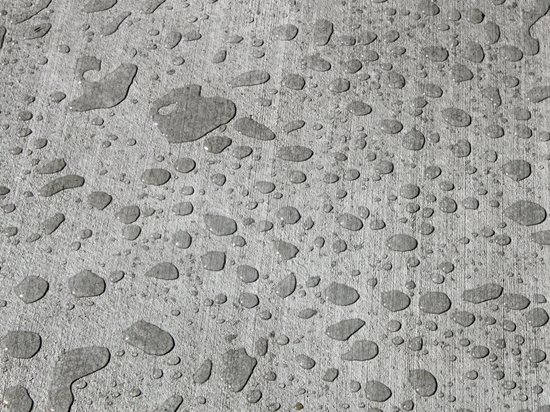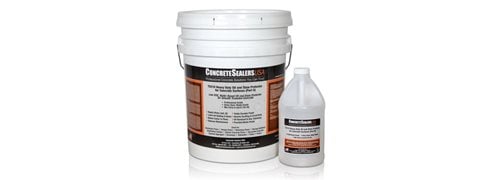- Concrete Sealer
- Comparison Chart of Concrete Sealers
- Buying Tips for Concrete Sealer Products
- Concrete Sealer Reviews: Sealer products other contractors use and recommend
- Common Questions about Concrete Sealers
- How to Remove Concrete Sealer
- Types of Sealers
- Acrylic Sealers
- Epoxy Sealers
- Penetrating Sealers
- Polyurethane Sealers
- Polyaspartic Sealers
- Application Surface
- Driveway Sealer
- Patio Sealer
- Pool Deck Sealer
- Sealers for Stamped Concrete
- Concrete Floor Sealers
- Concrete Countertop Sealers
- Pool Deck Sealer
- Exposed Aggregate Sealer
Plain-Language Answers to the Top 10 Sealer Questions
Answers to frequently asked sealer questions from a technical expert
To repel water and deicing salts, use an acrylic-resin sealer or reactive penetrating sealers.
If you also want to repel oil stains, use a siliconate (a type of reactive penetrating chemical sealer).
Owners of newly installed concrete are often told by their contractors to seal the concrete. What they usually aren’t told are the basics, such as why they should seal it, the best concrete sealer to use, how to apply it, and suitable applications. Answers to these questions aren’t easy to come by when you shop for sealers at a building supply store or on the Internet. Instead, you’re typically bombarded with a confusing array of performance claims and scientific terms.
To give you some simple answers to the top 10 sealer questions asked by users, we contacted Bill York, technical advisor at V-SEAL Concrete Sealers, Lewis Center, Ohio. Here is his plain-language advice for new installers.
- What surfaces should I seal?
Exterior concrete in any region subject to freeze-thaw cycles should be sealed (see these regional climate maps). Many people are surprised to learn that freeze-thaw regions include all of New Mexico, most of Texas, Alabama, Georgia, South Carolina, and even portions of California, Louisiana and Florida. In other regions, concrete should be sealed for specific purposes such as stain repellence, dust reduction, abrasion resistance, chemical resistance or to maintain an attractive appearance. - What happens if I don’t seal my concrete?
Concrete is a porous material that readily absorbs liquids. In freeze-thaw climates, the expansion of frozen liquids can destroy the surface of unsealed concrete. Oil, salt, fertilizer, and other household chemicals can discolor and damage unsealed concrete. - How much does sealer cost?
Acrylic-resin sealers and chemically reactive penetrating sealers (silanes, silicates, siloxanes and siliconates) generally cost $0.15 to $0.25 per square foot. High-performance topical coatings, such as epoxies and urethanes, will cost more -- typically $0.50 to $2.50 per square foot. In most cases, the investment in a sealer is well worth the expense, when you consider that the cost to replace concrete is generally $7 to $8 per square foot. - How will my sealed surface look?
That all depends on the type of sealer you apply. Most chemically reactive sealers are nearly invisible because they penetrate into the concrete. Solvent-based acrylic resin sealers and epoxies provide significant color enhancement and give concrete a high-gloss wet look. Water-based acrylic resin sealers provide moderate color enhancement and a satin appearance. Urethanes (generally applied as topcoat over epoxy) are available in a wide range of finishes, from matte to gloss (learn more in Should I Pick a High Gloss, Low Gloss or Matte Concrete Sealer?). Many sealers can also be colored with translucent or opaque tints. - How is sealer applied, and can I apply sealer myself?
Many sealers can be applied by a do-it-yourselfer using simple tools, such as a paint roller of pump-up sprayer. These include acrylic-resin sealers, reactive penetrating sealers, 50%-solids epoxies and 50%-solids urethanes. High-performance sealers such as 100%-solids epoxies, polyaspartic urethanes and polyureas require professional installation using special tools and application techniques. - When do I apply sealer?
Most acrylic-resin sealers and certain reactive penetrating sealers (siliconates and silicates) should be applied as soon as new concrete can withstand the weight of the installer. Other reactive penetrating sealers (silanes and siloxanes) and most high-performance coatings, such as epoxies and urethanes, should only be applied after the concrete is fully cured (generally 28 days). Almost all sealers can be applied after the concrete is 28 days old. - What will my sealer repel?
Again, that depends on the product you use. To repel water and deicing salts, use an acrylic-resin sealer or reactive penetrating sealers. If you also want to repel oil stains, use a siliconate (a type of reactive penetrating chemical sealer). Be aware that acrylic-resin sealers may be weakened by petroleum distillates, and reactive penetrating sealers are generally weakened by acidic chemicals that chemically etch concrete. For resistance to these substances, use a high-performance epoxy or urethane system. - Will sealer make my concrete slippery?
Reactive penetrating sealers generally have little effect upon the concrete surface profile or traction. Most topical coatings can affect concrete surface profile, and may require the use of anti-skid additives in areas exposed to foot or vehicle traffic (see Making Concrete Slip Resistant). - How long will my sealer last?
Because they penetrate the concrete, reactive chemical sealers will last the longest and generally only wear away if the substrate surface itself wears away, which may be 10 years or longer. You can get similar performance by using an epoxy or urethane system, which generally lasts 5 to 10 years depending on traffic exposure. Acrylic-resin sealers offer the shortest performance life - generally 1 to 3 years. - Is sealer environmentally friendly?
Concrete is locally made and can last for many decades with proper care. As sealers extend the useful life of concrete, they are an important component of “green” building and their use can qualify for additional LEED points. As for the sealer itself, water-based products are generally considered the most environmentally friendly. Some solvent-based sealers can’t be sold in certain states, but new environmentally friendly solvents are now available. Contact your concrete sealer supplier to learn more about the regulations in your state.
More Sealer FAQs
Four Types of Surface Protectant Products: What products are available for sealing and protecting my concrete surface?
VOC Regulations: What should I be aware of?
Moisture problems: How do I prevent moisture problems?
Deicing salts: Will deicing salts affect sealer performance?
Effects of temperature: How will temperature affect sealer reactivity?
Condensation: How do I deal with condensation on sealers?
Answers to fixing common sealer problems from expert Chris Sullivan
 D-One Penetrating Sealer
Non-yellowing, low sheen, good adhesion
D-One Penetrating Sealer
Non-yellowing, low sheen, good adhesion
 Deep Penetrating Sealer
RadonSeal - Waterproofs & strengthens.
Deep Penetrating Sealer
RadonSeal - Waterproofs & strengthens.
 Clear-Seal by Increte Systems
Seals and protects decorative surfaces.
Clear-Seal by Increte Systems
Seals and protects decorative surfaces.
 Heavy Duty Oil & Stain Protector
TS210 - 4 gal. kit ($439.95)
Heavy Duty Oil & Stain Protector
TS210 - 4 gal. kit ($439.95)
 Colored Concrete Sealer X-4
High gloss finish available in 20 colors
Colored Concrete Sealer X-4
High gloss finish available in 20 colors
 Gem-Guard SB
Penetrating sealer that protects against salt damage
Gem-Guard SB
Penetrating sealer that protects against salt damage
 Decorative Sealers
Reactive and penetrating formulas in various levels of gloss.
Decorative Sealers
Reactive and penetrating formulas in various levels of gloss.
 Water Repellent Penetrating
Sealer for driveways, parking structures, plazas, walkways & more.
Water Repellent Penetrating
Sealer for driveways, parking structures, plazas, walkways & more.
 Clear Acrylic Concrete Sealer
$219.30 (5 gal.)
Clear Acrylic Concrete Sealer
$219.30 (5 gal.)




